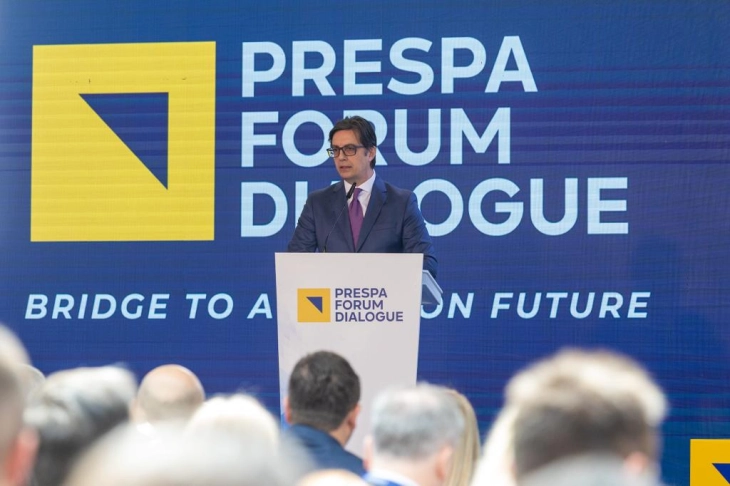Pendarovski: Sustaining democracy in Balkans requires systemic and irreversible progress
- We need systemic and irreversible progress in order to sustain democracy in the Balkans, for that we need a framework with at least five components: legal, political, economic, plus security and intelligence on a lesser scale, the first two secured best by the EU, and the other two by NATO, said President Stevo Pendarovski on Friday at the session “Peace and Democracy versus War and Autocracy” of the Prespa Forum Dialogue in Struga.
- Post By Angel Dimoski
- 11:41, 16 June, 2023

Struga, 16 June 2023 (MIA) - We need systemic and irreversible progress in order to sustain democracy in the Balkans, for that we need a framework with at least five components: legal, political, economic, plus security and intelligence on a lesser scale, the first two secured best by the EU, and the other two by NATO, said President Stevo Pendarovski on Friday at the session “Peace and Democracy versus War and Autocracy” of the Prespa Forum Dialogue in Struga.

“One-time events cannot sustain democracy, they can serve only as the lateral push and cannot be the core of mutual efforts to democratize,” said Pendarovski, talking about what the Euro-Atlantic community should do in order to support democracy in the Balkans.
According to the Macedonian President, technology, and especially artificial intelligence, cannot promote democracy.
“Modern technologies offer much more room for manipulation of people, and much more room for informing people and using diversified sources of info. States and international organizations should start as soon as possible to regulate this area. First of all, through licensing of the subjects present on social media, and individual responsibility for the individuals who are placing content on social media platforms,” said Pendarovski.

Regarding the thesis that the war in Ukraine has changed geopolitics and the focus has been brought back to democracy, President Pendarovski said he agrees with the first part of the statement, but partially disagrees with the second.
“War certainly brought back the focus on geopolitics, but I’m not quite sure at all that it brought back the focus on democracy, at least on the continent. In my view, Putin’s war in Ukraine was mainly instigated by his mode of thinking and his desire to restore the former USSR and the sphere of influence, because in essence this is a war for territory. The EU, in my view, is also not looking too much into that dichotomy as the name of the panel, democracy versus autocracy, and I agree that many scholars, institutions, practitioners, have for years back documented the backsliding in certain corners of the continent and the world towards autocracy, but that has nothing directly to do with the war in Ukraine,” said Pendarovski.
The dominance of a geopolitical mode of thinking in the part of the EU, stressed Pendarovski, has undoubtedly been present in the last 18–20 months, and, according to the President, this is worrying.
“This mode of thinking is quite similar to NATO’s mode of thinking. Geopolitical reasoning behind the enlargement policy. Why is this worrying for me? Because NATO is predominantly a security organization, the EU is not. The inner structure of the EU is a bit different from the NATO alliance, and if the war in Ukraine is really an incentive for entering into a geopolitical mode of thinking and an incentive to look back to the region and pay more attention to the enlargement in this region of the Western Balkans, then quite naturally the question follows what will happen when the war in Ukraine is over. Are we going to go back to business as usual, which means less attention to the Western Balkan as a region, as a whole, not only regarding the enlargement process?” said Pendarovski.
The President said he believes the slow pace of Euro-integration threatens democracy in the Balkans, and noted that it is time for EU negotiations to begin, for membership and democratic progress.
“Without supervision by the EU, backsliding is obvious and in many cases inevitable. After being so long in the waiting room of the EU, people in North Macedonia are quite naturally looking for alternatives. And that is translated in the sharp drop in EU enthusiasm. We have recorded the sharpest drop in support for EU membership of 25 percent in the last 20 months. If there are no negotiations, this opens up space for the so-called malign influences by the third actors, of the so-called extra regional powers, because the country, being in such a situation, is not a part of the common information sharing and it is not a part, formally, of the crisis management mechanisms,” underlined Pendarovski.
Photo: President's Office







